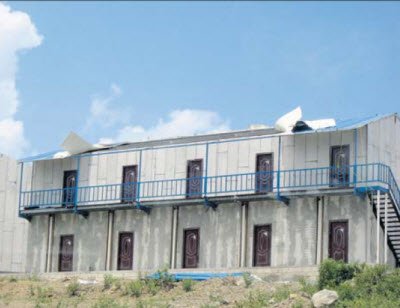The Daily Herald reports today that Commissioner Reginald Zaandam of Statia said that apartment owners and others who invested financially to cater to students and staff at University of St. Eustatius School of Medicine put the blame squarely on the shoulders of the governments of Statia and The Netherlands
for the school not obtaining the required accreditation. “This perception is far from the truth,” Commissioner Zaandam said.

(Photo The Daily herald)
In a letter dated September 4, 2006, former Minister of Health of The Netherlands Antilles Omayra Leeflang informed Associate Dean at Statia Medical School, Peter Esteban, that none of the medical schools in The Netherlands Antilles were accredited by government.
“The procedure to obtain accreditation was outlined in the letter, and the minister underscored the importance for the schools to start that process towards accreditation of the school as soon as possible,” Zaandam stated. A month later, the health ministers of The Netherlands and The Netherlands Antilles requested Dutch Flemish Accreditation Organisation NVAO to assess the quality of medical schools in The Netherlands Antilles, based on the “Initial Accreditation Framework Higher Education,” which is the benchmark in assessing higher learning in the Dutch Kingdom.
NVAO held an information session in Curaçao in 2007, during which the assessment was explained in detail. The medical schools were also requested to submit information files, including a self-evaluation report.
As a result of this informative session, Brenda S. Kirby submitted an application to NVAO on behalf of Statia Medical School in April 2008, for the assessment of the basic quality of the school’s Doctor of Medicine (MD) degree course, Commissioner Zaandam explained. “It is also important to
mention that Saba’s Medical School was also among the five medical schools that submitted applications for the assessment of their MD courses,” he added.
Shortly thereafter, a committee consisting of three professors was appointed by The Netherlands, The Netherlands Antilles, Foundation for Advancement of International Medical Education and Research (FAIMER) and Educational Committee for Foreign Medical Graduates (ECFMG). The last two organisations are in charge of the listing of medical graduates in the United States.
The assessment of the programme of the MD degree course at Statia’s Medical School took place in November 2008. “Of the 16 standards that were assessed 10 were assessed as unsatisfactory. As a result of that NVAO gave a negative assessment of the course,” Zaandam said. “The Saba Medical School assessment of their MD degree course was assessed satisfactory and as a result of that they are now accredited.”
Since the dismantling of The Netherlands Antilles was imminent and there were no serious attempts of the medical school to submit a new application to seek another assessment, the governments of Holland and the Netherlands Antilles informed the school in writing that it should reorganize and work on the failed standards and submit a new application for assessment by in charge of the listing of medical graduates in the United States.
The assessment of the programme of the MD degree course at Statia’s Medical School took place in November 2008. “Of the 16 standards that were assessed 10 were assessed as unsatisfactory. As a result of that NVAO gave a negative assessment of the course,” Zaandam said. “The Saba Medical School assessment of their MD degree course was assessed satisfactory and as a result of that they are now accredited.”
Since the dismantling of The Netherlands Antilles was imminent and there were no serious attempts of the medical school to submit a new application to seek another assessment, the governments of Holland and The Netherlands Antilles informed the school in writing that it should reorganize and work on the failed standards and submit a new application for assessment by school found that necessary is not clear,” he said.
In July, the Commissioner of Health had several meetings with the medical school’s officials to seek ways and means to help convince FAIMER/ECFMG to grant the school yet another extension of two years.
FAIMER/ECFMG received a letter in which it was stated under which stipulations and conditions the medical school would conduct its operations if FAIMER/ECFMG would grant them another extension towards securing the accreditation at the end of a set period. It was also underscored that during these two years, Holland would take the same position as during the first extension period, Zaandam explained.
However, Vice President of Operations and Strategic Development Joseph L. Johnson asked government not to send the letter “because he was of the opinion that the content would miss the objective of what Statia Medical School wanted,” Zaandam said.
“Government requested an explanation, but Mr. Johnson at that time chose to emphasize not to send the letter as yet because he had additional information
he liked to be added to the content; that was nearly two weeks ago. On behalf of government, I called his cell phone many times, without any result. So, government is wondering if there is more in mortar besides the pestle,” the commissioner concluded.
 Archive of posts from Saba-News.com Archive Saba News
Archive of posts from Saba-News.com Archive Saba News